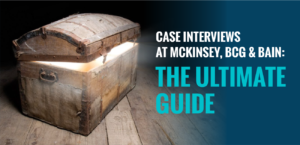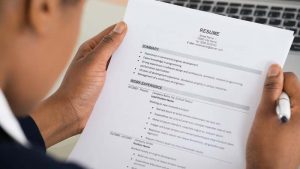
All top consultancies require candidates to be able to solve numerical problems with just pen and paper during both case interviews and the screening test before interviews.
Many candidates feel that their numeracy skills have become a little rusty after years of using Excel or calculators. To add to the rustiness, candidates are rarely prepared for the added pressure of having an interviewer look over their shoulders as they perform multi-step calculations.
So, to help you brush up on your numeracy skills, here are a few tips and resources.
Brush up arithmetic
To make sure you’re prepared for the vast majority of the potential questions, be sure to brush up your skills for solving basic and common arithmetic operations:
- Addition
- Subtraction
- Multiplication
- Division
- Percentage
- Percentage of percentage
- Fraction Simplification
There are many opportunities to practice these operations in everyday life. For example, you can calculate percentages based on train stations left on your journey, laps completed on the treadmill, your share of a restaurant bill, or headline figures on your morning paper. But if you want to implement a more aggressive regimen, spend 10 minutes a day practicing using the Math Drills we’ve developed inside the Interview Prep Course.
Once you are comfortable with your arithmetic, revisit some more advanced concepts such as weighted average, factoring, expected value, squares, and compounding and discounting.
Brush up on your business math
Practising common math operations will only get you so far. You’ll also need to know what these math problems look like in a business context, which means you should familiarise yourself with:
- Profit and loss sheets
- Balance sheets
- Market and market share
- Compound growth rates
- Break-even calculations
- Discounted Cash Flow
- Net present value
Once you fully understand and can use each of these, you’re in a good place to handle the vast majority of math you might come across in a case interview.
Practice case math
Putting it all together and practising math in the context of cases is important to allow you to test your skills under pressure within a real case scenario.
You can do this in four ways, and we recommend that you do all four!
First, make sure to do at least 25 live case interviews involving math problems, so you can get a feel for what solving math on the fly feels like and to help you identify any of your weaknesses.
Second, practice market estimation questions. These types of questions ask you to estimate the size of a specific market, which requires you to draw upon your general knowledge, to make assumptions, and to do basic calculations to come to a reasonable answer. The good news is that you can do this on your own, which makes practising these types of problems easier than full cases.
Third, practice the sample Problem-Solving Tests available on McKinsey’s website. These tests include the types of math problems you are likely to come across in a real case interview. Remember to review and dissect each math question so you know how to calculate the answer quickly, whether you got the answer right the first time or not.
Finally, practice your math using the Exhibit Drills inside our Interview Prep Course. Often the best insights are drawn from case exhibits when you take the initiative to do calculations using the data in the charts. Practising this skill will help you stand out in your interview and further demonstrate your math skills.
Make sure you’re learning from the experts by joining us in the Interview Prep Course where you’ll find everything you need to prepare for and nail your interviews at McKinsey, BCG and Bain.






